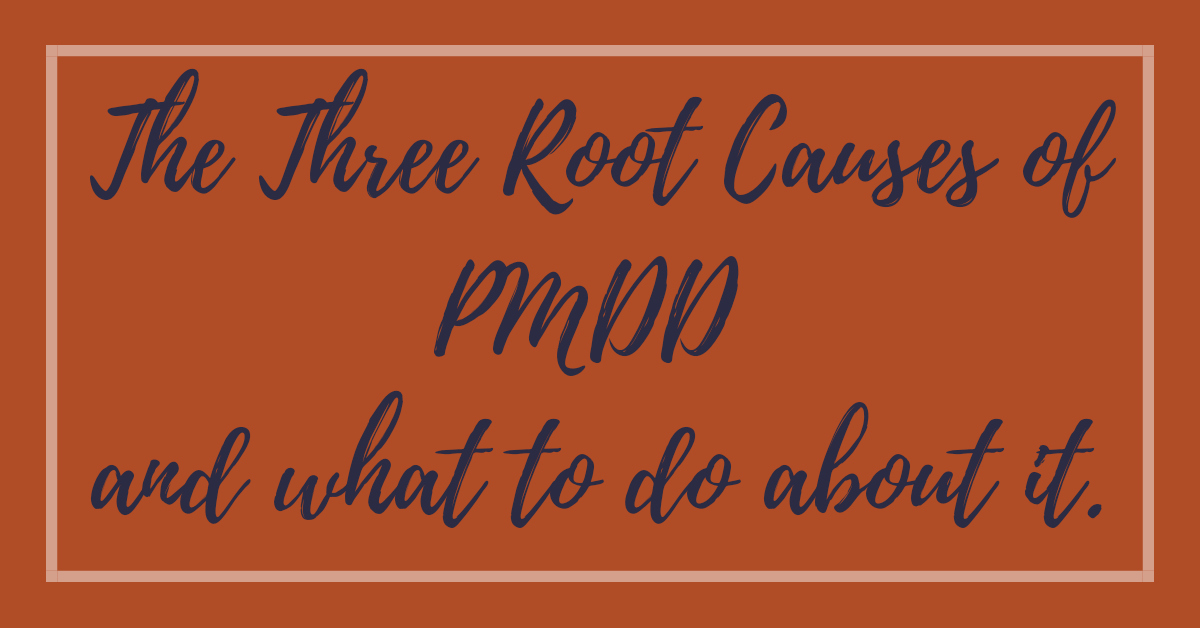Premenstrual Dysphoric Disorder (PMDD) is generally referred to as a more severe form of PMS. While the symptoms do tend to be more intense versions of those associated with PMS- PMDD is not necessarily related to PMS. There are three distinct variations of hormonal issues that could be causing your PMDD symptoms: 1- Hormonal Imbalance 2- Histamine Intolerance 3- Gene Mutation Expression.

Which type of PMDD do I have?
Hormonal Imbalance
Severe hormone imbalances can definitely cause symptoms associated with PMDD. This would definitely be what I would consider to be the more severe form of PMS. These symptoms may be due to both low estrogen and progesterone, an extreme imbalance of estrogen to progesterone in the luteal phase, or very low to almost non-existent progesterone. To find out if this is what is causing your PMDD issues ask your doctor for what is typically referred to as a day 21 hormone test. However, your cycles may not line up with the textbook 28 day cycle so make sure to track when you are ovulating and go in for the blood test 7 days after ovulation. This will give you and your doctor the best picture of where your hormones are compared to where they should be. If you do not wish to take a blood test or you want to learn even more about your hormones and imbalances you can order a DUTCH test. This urine test is a very comprehensive hormone test and can give you so much information about what is going on in your cycle.
Histamine Intolerance
If you are experiencing histamine intolerance issues you will likely have many of the same symptoms as PMDD and often they will ebb and flow with your cycle because histamine is affected by your hormones (specifically estrogen). Often times your symptoms will be worse during ovulation and a week after ovulation when estrogen spikes. An elimination diet is the easiest, cheapest, and most sure-fire way to determine if Histamine is the cause of your PMDD symptoms. You would want to avoid histamine containing and releasing foods for 3-4 weeks. These foods can include: ferments (like saur kraut, Kombucha, yogurt, etc.), citrus, nightshades, most dairy, wheat, avocados and cured meats. After avoiding these foods reintroduce them and see how you feel. If you have any of the following symptoms then you are histamine intolerant. Symptoms of a histamine reaction include: headache, congestion/runny nose, anxiety, dermatographia, breast pain, fatigue, hives, nausea, or vomiting.
Genetic Mutation
First, I would like to say that just because you have a gene mutation does not mean that it has to be expressed and cause issues. Research in epigenetics has shown us that our environment undeniably has influence on which genes are expressed. That being said there are several possible genes that may be at the root of your PMDD symptoms. These genes include the Estrogen Receptor Alpha gene (ESR1), and Serotonin 1 C polymorphism. The studies on genetic mutations and PMMD are few and relatively new so these genes may not be exactly what is causing PMDD or there may be more involved but there is definitely evidence showing a link between genetics and PMDD. Due to the fact that the research is so new, there is currently no test available to see if this is what is causing your PMDD. However, if you rule out the first two options then this last option is more than likely the issue.

How do I deal with my type of PMMD?
The first step to healing any issue in your body is by making sure you are eating a well prepared and sourced nutrient-rich diet. This means lots of veggies, healthy fats, and healthy meats.

If you have PMDD due to hormonal imbalance then you really want to focus on adding in lots of healthy fats to support hormone production, eat plenty of cruciferous veggies to support detoxification of extra hormones, and eliminate and reduce stressors so your body can focus on hormone production instead of putting out fires every where else. Great supplements to help your body heal and rebalance are Magnesium, Omega-3s and a methylated B complex.
If histamine is the root cause of your PMDD symptoms then obviously you want to continue on the low histamine diet. This is not meant to be forever though, just until you heal the real root cause which is leaky gut. Gut healing foods like bone broth, collagen, cabbage, and apples are going to be essential. Supplements that are helpful are apple cider vinegar (may cause a histamine reaction in some individuals, so be cautious with this one) or digestive bitters, digestive enzymes, quercetin, magnesium, SAMe, and Vitamin B6.
If you feel that your root cause is purely genetic then you want to focus on preventing the expression of the gene mutations. You do this by making sure your body is working optimally through diet. We are now finding that many of our genes are affected by the health of our gut and gut flora. So, you want to make sure you are keeping your gut happy with lots of pre and pro biotics, and nourishing foods like bone broth and cabbage. You also want to avoid over taxing the body with toxins like plastics, chemicals and heavy metals. These environmental toxins are well known to activate gene mutations and generally wreak havoc with our systems.

No matter which type of PMDD you have you can heal through holistic means, but don’t be afraid to seek medical help if your symptoms are so severe that you are stuck in bed all day. While medications don’t treat the root cause they can certainly make you feel more comfortable while you work on healing your body naturally.
References-

